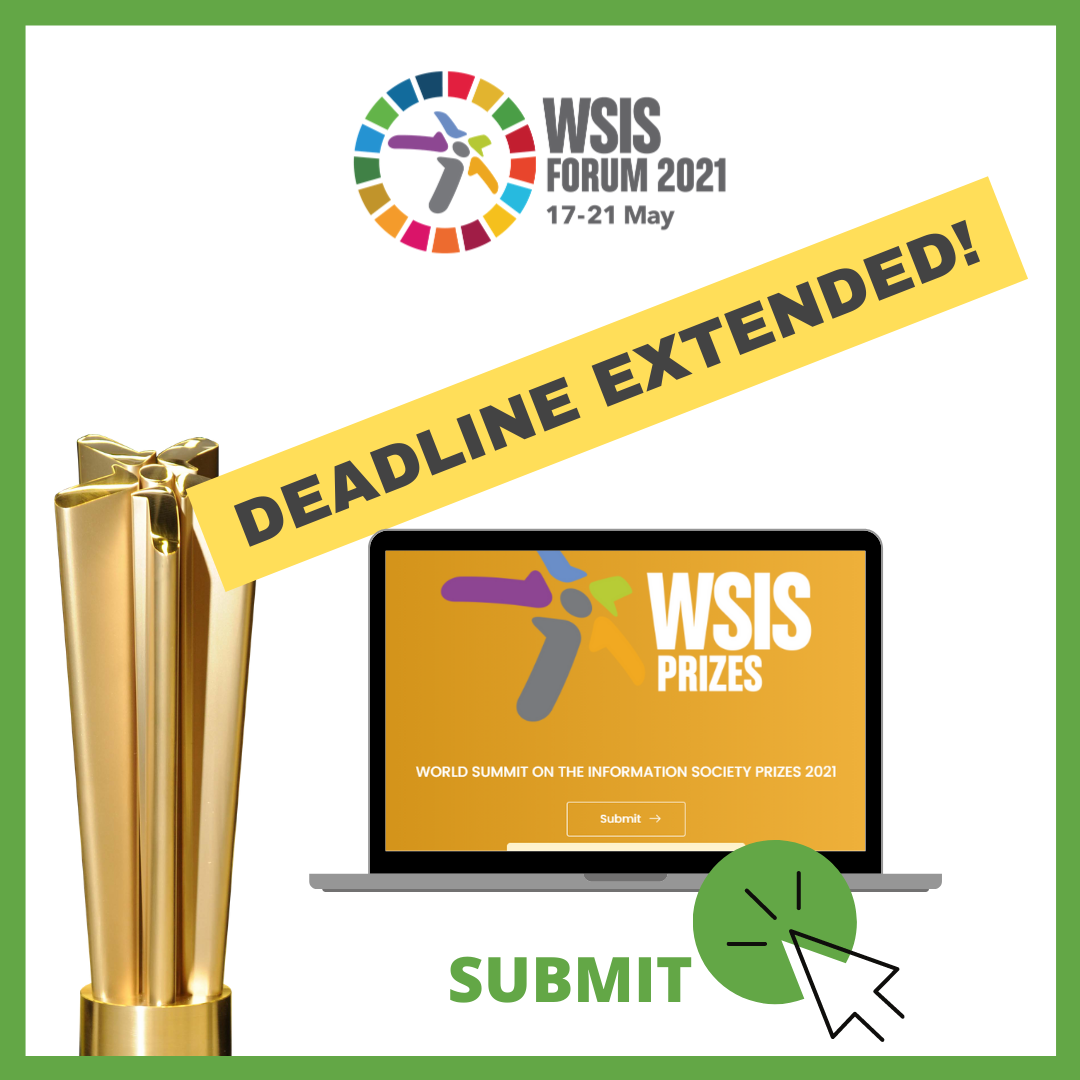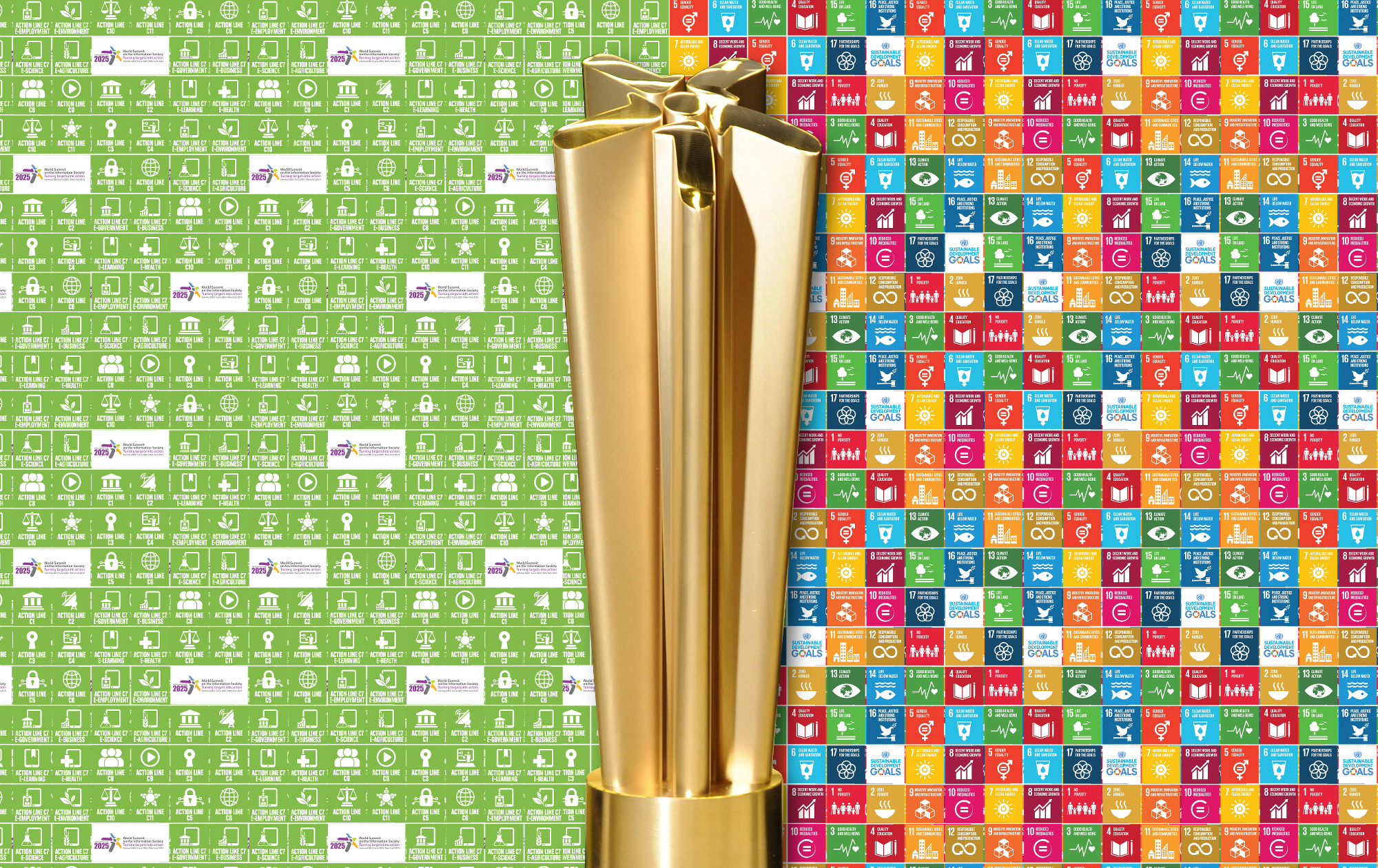The International Telecommunications Union (ITU) on behalf of the WSIS Stakeholders announces the launch of the 10th edition of the WSIS prizes and calls for submission through the http://itu.int/go/JON9 by the February 1st, 2021.
The WSIS Prizes 2021 is an exceptional international recognition of the WSIS Stakeholders as Winners and Champions for their excellence in supporting the implementation of the WSIS outcomes, in particular WSIS Action Lines supporting the achievement of the Sustainable Development Goals (SDGs).

During the period from 1 November 2020 to 1st of February 2021, all WSIS stakeholders are invited to submit WSIS related projects to the WSIS Prize 2021 contest.
Five Phases of the Contest : There are five phases to the WSIS Prizes 2021:
- The first phase : Submission phase (1 November 2019 to 25 January 2021)
- The second phase : Nomination phase. Revision of submitted projects that will result with a list of 360 nominated projects, twenty (20) projects per Action Line Category (18) (1 February 2021 to 26 February 2021)
- The third phase : Public online voting (1 March to 31 March 2021)
- The fourth phase : Selection of winning proects by the ITU Expert Group that will result with a list of winning projects (1 April 2021 – 12 April 2021)
- The fifth phase : Announcement of winners to the public during the WSIS Prize 2021 Ceremony at WSIS Forum 2021, and the release of publication “WSIS Stocktaking; Success Stories 2021” (Announced at the WSIS Forum 17-21 May 2021)
About the WSIS Prizes:
The WSIS Prizes contest was developed in response to requests from the WSIS stakeholders to create an effective mechanism to evaluate projects and activities that leverage the power of information and communication technologies (ICTs) to advance sustainable development.Since its inception, the contest of WSIS Prizes has attracted more than 300,000 stakeholders.
Following the outcomes of the United Nations General Assembly Overall Review on WSIS (Res. A/70/125) that called for a close alignment between the WSIS Process and the 2030 Agenda for Sustainable Development (Res. A/70/1), the WSIS Prizes is the unique global platform to identify and showcase success stories in the implementation of the WSIS Action Lines and SDGs.
About the WSIS :
The UN General Assembly Resolution 56/183 (21 December 2001) endorsed the holding of the World Summit on the Information Society (WSIS) in two phases. The first phase took place in Geneva from 10 to 12 December 2003 and the second phase took place in Tunis, from 16 to 18 November 2005.
Geneva Phase: 10-12 December 2003
The objective of the first phase was to develop and foster a clear statement of political will and take concrete steps to establish the foundations for an Information Society for all, reflecting all the different interests at stake.
Nearly 50 Heads of state/government and Vice-Presidents, 82 Ministers, and 26 Vice-Ministers from 175 countries as well as high-level representatives from international organizations, private sector, and civil society attended the Geneva Phase of WSIS and gave political support to the Geneva Declaration of Principles and Geneva Plan of Action that were adopted on 12 December 2003. More than 11,000 participants from 175 countries attended the Summit and related events.
- Full texts of the Geneva Declaration of Principles and Geneva Plan of Action
- More on the first phase of WSIS
Tunis Phase: 16-18 November 2005
The objective of the second phase was to put Geneva’s Plan of Action into motion as well as to find solutions and reach agreements in the fields of Internet governance, financing mechanisms, and follow-up and implementation of the Geneva and Tunis documents.
Nearly 50 Heads of state/government and Vice-Presidents and 197 Ministers, Vice Ministers and Deputy Ministers from 174 countries as well as high-level representatives from international organizations, private sector, and civil society attended the Tunis Phase of WSIS and gave political support to the Tunis Commitment and Tunis Agenda for the Information Society that were adopted on 18 November 2005. More than 19,000 participants from 174 countries attended the Summit and related events.
- Full texts of the Tunis Commitment and Tunis Agenda for the Information Society
- More on the second phase of WSIS
More information: https://www.itu.int/net4/wsis/stocktaking/Prizes/2021/
